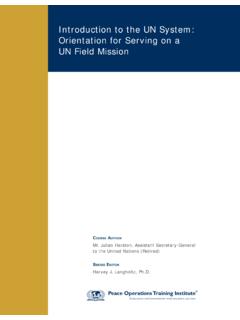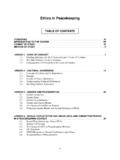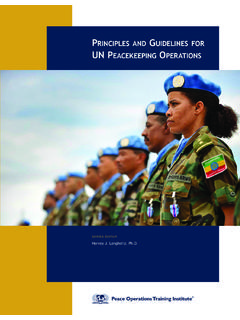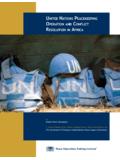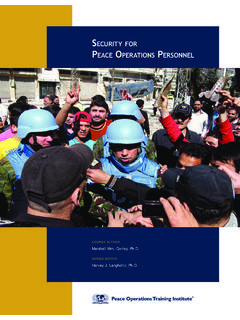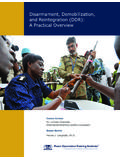Transcription of Logistical Support to United Nations eacekP eeping Oper ...
1 Course AuthorMajor Rod Little, Canadian Armed Forces (Retired)Series EditorHarvey J. Langholtz, Support to United Nations Peacekeeping Operations: An IntroductionPeace Operations Tr aining Institute Peace Operations Tr aining Institute Course AuthorMajor Rod Little, Canadian Armed Forces (Retired)Series EditorHarvey J. Langholtz, Support to United Nations Peacekeeping Operations: An IntroductionCover Photo: UN Photo #652240 by Logan Abassi. The United Nations Stabilization Mission in Haiti (MINUSTAH) provides Logistical Support to Haiti's Provisionary Electoral Council (CEP) to transport voters ballots from around the country to the capital Port-au-Prince for tabulation.
2 27 October 2015. 2019 Peace Operations Training Institute. All rights Operations Training Institute 1309 Jamestown Road, Suite 202 Williamsburg, VA 23185 USA edition: 1995 by LCOL Charles Grimm Second edition: October 2002 by Kamran Baig Updated and Revised: April 2010 Third edition: 2015 by Maj. Rod Little Updated and Revised: November 2019 The material contained herein does not necessarily reflect the views of the Peace Operations Training Institute (POTI), the Course Author(s), or any United Nations organs or affiliated organizations.
3 The Peace Operations Training Institute is an international not-for-profit NGO registered as a 501(c)(3) with the Internal Revenue Service of the United States of America. The Peace Operations Training Institute is a separate legal entity from the United Nations . Although every effort has been made to verify the contents of this course, the Peace Operations Training Institute and the Course Author(s) disclaim any and all responsibility for facts and opinions contained in the text, which have been assimilated largely from open media and other independent sources. This course was written to be a pedagogical and teaching document, consistent with existing UN policy and doctrine, but this course does not establish or promulgate doctrine.
4 Only officially vetted and approved UN documents may establish or promulgate UN policy or doctrine. Information with diametrically opposing views is sometimes provided on given topics, in order to stimulate scholarly interest, and is in keeping with the norms of pure and free academic pursuit. Versions of this course offered in other languages may differ slightly from the primary English master copy. Translators make every effort to retain the integrity of the Support to United Nations Peacekeeping Operations: An IntroductionvPEACE OPERATIONS TRAINING INSTITUTET able of ContentsForum Questions viiiMethod of Study ixLesson 1 An Overview of United Nations Peacekeeping and Logistical Support 10 Section Introduction to United Nations Peacekeeping 12 Section Spectrum of Peace and Security Activities 16 Section Types of Peace Operations 19 Lesson 2 UN Logistics at Work 26 Section Global Field Support Strategy An Overview 28 Section Objectives of the GFSS 30 Section Umoja 33 Section Integrated Support Services UN Logistics at the Mission-Level 35 Section
5 United Nations -Owned Equipment in the Field 38 Lesson 3 Contingent-Owned Equipment 42 Section Memorandum of Understanding (MOU) 44 Section Personnel 46 PEACE OPERATIONS TRAINING INSTITUTEvISection Major Equipment 48 Section Mission Factors and Loss or Damage 49 Section Self-Sustainment 51 Section Inspections 53 Lesson 4 UN Medical System 58 Section UN Medical System Command Structure 60 Section Level I to Iv Medical Support 61 Section Casualty Treatment and Evacuation 64 Section Medical Logistics 67 Lesson 5 Funding UN Peacekeeping 74 Section Finance 76 Section The Budget Approval Process 79 Section Financial Responsibilities Within the Mission Area 80 Section Procurement
6 Activities 80 Section Property Control and Inventory 81 Section In and Out Survey 82 Section Equipment Write-Off 82 Section Letters of Assist 83 Lesson 6 Logistics During Mission Start-Up 86 Section Fundamentals of Expeditionary Logistics 89 Section Logistics Planning Tools 91 Section Mission Start-Up Considerations During Pre-deployment 93 Section Rapid Deployment and Mission Start-Up Logistics Activities 95 Section Reception, Staging, Onward-Movement, and Integration 98 Lesson 7 Logistics During Mandate Implementation 104 PEACE OPERATIONS TRAINING INSTITUTEvIISection Mission Support Drivers 106 Section Logistics Focus During the Mandate Implementation Phase 108 Section Peacekeeping Engineering 112 Section Peacekeeping Transportation and Maintenance 113 Section Peacekeeping Supply 116 Section Host Nation Support (HNS)
7 117 Lesson 8 Logistics During Transition 122 Section Logistics Focus During Transition 124 Section UN Liquidation 125 Section Liquidation Procedures 128 Section Scaling Down and Withdrawal of Mission Personnel and Equipment 130 Section Material Disposal/Depreciation 136 Appendix A: List of Acronyms 142 Appendix B: Glossary 149 Appendix C: Current UN Peacekeeping Missions 179 About the Author: Major Rod Little 180 Instructions for the End-of-Course Examination 181 PEACE OPERATIONS TRAINING INSTITUTEvIIIF orum Questions From your perspective, why is it important for all members of a UN mission to understand how logistics is provided?
8 How do mission factors influence how logistics is carried out? Major Rod Little, a video introduction to this course at < >. PEACE OPERATIONS TRAINING INSTITUTEIxMethod of StudyThis self-paced course aims to give students flexibility in their approach to learning. The following steps are meant to provide motivation and guidance about some possible strategies and minimum expectations for completing this course successfully: Before you begin studying, first browse through the entire course material. Notice the lesson and section titles to get an overall idea of what will be involved as you proceed.
9 The material is meant to be relevant and practical. Instead of memorizing individual details, strive to understand concepts and overall perspectives in regard to the United Nations system. Set personal guidelines and benchmarks regarding how you want to schedule your time. Study the lesson content and the learning objectives. At the beginning of each lesson, orient yourself to the main points. If possible, read the material twice to ensure maximum understanding and retention, and let time elapse between readings. At the end of each lesson, take the End-of-Lesson Quiz. Clarify any missed questions by re-reading the appropriate sections, and focus on retaining the correct information.
10 After you complete all of the lessons, prepare for the End-of-Course Examination by taking time to review the main points of each lesson. Then, when ready, log into your online student classroom and take the End-of-Course Examination in one sitting. Access your online classroom at < > from virtually anywhere in the world. Your exam will be scored electronically. If you achieve a passing grade of 75 per cent or higher on the exam, you will be awarded a Certificate of Completion. If you score below 75 per cent, you will be given one opportunity to take a second version of the End-of-Course Examination. A note about language: This course uses English spelling according to the standards of the Oxford English Dictionary ( United Kingdom) and the United Nations Editorial Features of Your Online Classroom Access to all of your courses; A secure testing environment in which to complete your training; Access to additional training resources, including multimedia course supplements; The ability to download your Certificate of Completion for any completed course.
